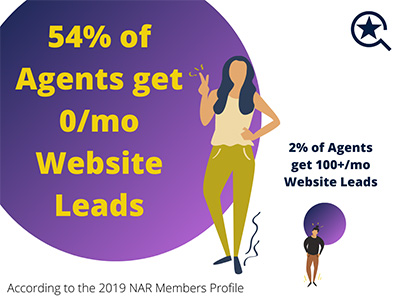7 Reasons Realtors DON’T Need a Personal Website
I own my own real estate website.
I love my real estate website.
There are a lot of good reasons to own your own website as a Realtor!
But there are some good reasons not to.
No, you do not need to own your own personal website as a real estate agent if it is not consistent with your lead generation strategy, though it is a good idea in most cases.
According to the National Association of Realtors (NAR) 2020 Member Profile, only 26% of real estate agents reported having their own personal website (e.g. not provided by the brokerage).
Here’s why!
To Website or Not To Website
“You have to have a website!”
That is the advice most new agents probably get.
And while it is not bad advice, most agents giving the advice, however, probably don’t know what they are talking about.
The reality is – you do not have to have a website in order to be a successful real estate agent. Most real estate transactions are done on referrals, and some of the most successful agents generate leads entirely from referrals. It is still possible to build a business offline.
There are major upstart tech companies trying to displace Realtors, and one day they may succeed. But you aren’t going to change that with “www.YourSarasotaRealEstateAgent.com”.
7 Reasons to Skip a Website
#1 Most Realtors Get ZERO Leads from Personal Websites
The NAR Member Profile says that 54% of agents get zero real estate leads from their website. Only 2% get more than 100 leads per year from their site. Only 9% said they have a blog.

Instead, a typical real estate professional still gets their business from repeat and referral customers, not online leads. 17% of leads come from repeat and referral business.
Buyers and sellers work with people they trust. They trust friends and family more than any other source. A referral from a friend is going to outrank my #1 search result for “Killeen, TX Realtor” every day.
If you are allergic to technology, but love people, focus on your referral business.
#2 You Can Outsource Online Lead Generation to the Portals …
“What about website leads?”
What website leads? Your dinky little site probably isn’t ranking for any competitive keywords!
Instead, you could get leads from Realtor.com, Zillow, or other sources without needing a website for them.
Zillow, Trulia, Realtor.com, Homes.com, the major brokerages, and even MLSs like HAR generally rank for the most competitive real estate keywords on Google, even against top producing agents and teams.
Instead of fighting them, why not join them! They have done all the work for you, ranking on Google, and are ready to send leads to you at a price. Sure it costs more than if you had built, developed, and nurtured a website yourself. But is that really how you want to spend your time? Or is it meeting with buyers and sellers and doing deals?
Piggybacking the success of the portals is a perfectly acceptable business model.
#3 … Because You Aren’t Going to Outcompete Them
“But I want to be found on Google!”
SEO, short for “search engine optimization”, is indeed the #1 reason to own and build your own website. Unlike paying for leads on Zillow or Realtor.com, SEO leads are free! A home buyer types “realtor in [your city]“, and your website pops up in the organic (i.e. no paid) search results. They click, sign in or call you, and voila! You didn’t spend a dime!
That is great! And you can do that. SEO works! But only if you are ready to take your website very seriously.
There are agents who do this successfully. They have websites that rank and earn organic traffic. T
But there aren’t many!
There are 10 first-page spots on Google’s search results. Zillow, Trulia, and Realtor.com (ZTR) are going to take three spots. So that means maybe, at most, 7 spots for local agents. Are you prepared to build a website that is at least in the top 7 in your market?
If not, then don’t plan on or expect organic Google leads. SEO is a distraction.
#4 There Are Substitutes for Websites
Facebook is pretty serious about making itself a viable business platform, and your Facebook Business page is a mini-website in and of itself. It has the capabilities of running Facebook lead ads as well, which are essentially landing pages for you. Visitors can fill out a Messenger lead capture form with contact information just as they would on your own website.
For a variety of reasons, it is not a great idea to build your business on someone else’s property. But if you are getting your leads from, say, referrals, or farming, or direct mail, then a website may not be all that essential. A Facebook business page might work just fine!
Similarly, you can replicate some of the functions of a website with, perhaps, your customer relationship management system (CRM), or a landing page service if you are doing paid advertising but lack a website. There is an entire trend even among mainstream websites to adopt a landing-page-like feel, and your site would not feel out of place at all.
#5 Your Broker Has a Website
Having a website separate from your broker has advantages. You keep it when you move brokers. You can control the backend and customize it. You have it branded for you and are the decision-maker.
But it’s possible your broker has some pretty powerful technology that does what you need. These are called the real estate platforms, and include folks like kvCORE, Curaytor, and CINC. Many of these, in addition to having the broker’s main page, have subdomains for agents. That means you can have your own little website within a website. These can be expensive tools that would cost you a relative fortune on your own.
Why spend time and money for something you already have?
#6 You Aren’t Going to Use it Anyway
There are many things a website can do for you.
But they are no good if you aren’t going to put the work and time into to make it happen.
Writing and publishing a single blog post can take a couple hours at least. Is that the highest and best use of your time?
Don’t let your website become a distraction from your money-making activities. If you are focused on commercial investors, or door knocking, or direct mail, or open houses, or just working your sphere, your time may be better spent on those tasks.
#7 SEO is Getting Harder
Technology is always changing. Right now the SEO world is pulling its hair out over EAT and the decline in clickthroughs on the SERPs. What happens when instead of 10 results on the first page of Google, there is only 1?
There are a lot of unknowns, and expecting to keep up with those changes and trends is asking a lot.
Weak websites will become only more and more marginalized over time.
Top Agents With Lousy Websites
Prove it! Show me some top agents with lousy websites!
Here are some agents who, as best I can tell, simply use their own brokerages’ pages (the number of transactions are per reports from Real Trends: Top 1000 of Real Trends).
- Phil Rotondo, 324 transactions
- Brenda Woody, 300 transactions
- Robbie Ingle, 286 transactions
There’s nothing wrong with using your brokerage’s website, or none at all.
Yeah, but I want a website, though
Awesome!
I’ve written a lot about building websites on this site, including a guide to how to start your own in WordPress.
Before you start, you’ll also want to understand which of the three types of real estate websites you need.
Lastly, when ready, be sure to check out my reviews of the top real estate website providers!
Conclusion
Make no mistake. I still think getting your own website is likely a very good idea. Even if it isn’t the core of your business, having a professional online presence, or “business card” site, is still probably a good idea. Or perhaps a website with some solid home search so your buyers are on your branded search instead of someone else’s. Get yourself a little piece of real estate for yourself online! And getting started with a website now means you will be in a better position to grow it in the future.
But that doesn’t mean it is necessary for everyone, especially if it is distracting you from the money productive activities you should be doing. Clearly, there are numerous top agents doing well without a website powering their success, even in 2018.
If you are ready to build your own website, do it right, and check out the best real estate websites in 2018.
Updated May 15, 2021; Originally published September 28, 2018.



Finally someone who says the truth! Real Estate sites are mostly a distraction anyway. a blog based site could be interesting.